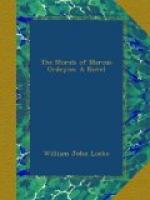“And Stenson. No one seeing Stenson could doubt the irreproachable propriety of his master.”
“I really have no patience with you,” said Judith.
It is hopeless to discuss Carlotta with her. I shall do it no more.
We sat for a while under the trees, and conversed on rational topics. She likes her employment with Willoughby. The morning she spends among blue books and other waste matter at the British Museum, and she devotes the evening to sorting her information. Willoughby commends her highly.
“And there is something I know you’ll be very pleased to hear,” she continued. “Who do you think called on me yesterday? Mrs. Willoughby. Her husband wants me to spend August and September at a place they have taken in North Wales, and help him with his new book—as a private secretary, you know. I said that I never went into society. I must tell you this was the first time I had seen her. She put her hand on my arm in the sweetest way in the world and said: ’I know all about it, my dear, and that is why I thought I’d come myself as Harold’s ambassador.’ Wasn’t it beautiful of her?”
She looked at me and her eyes were filled with tears.
“Marcus dear, I am not a bad woman, am I?”
“My dearest,” I answered, very deeply touched, “you are the best woman in the world. So far from conferring a favour on you, Mrs. Willoughby has gained for herself the inestimable privilege of your friendship.”
“Ah!” said Judith, “a man cannot tell what it means.”
Really men are not such dullard dunderheads as women are pleased to imagine. I have the most crystalline perception of what Mrs. Willoughby’s invitation means to Judith. Women appear to find a morbid satisfaction in the fiction that their sex is actuated by a mysterious nexus of emotions and motives which the grosser sense of man is powerless to appreciate. In her heart of hearts it is a prodigious comfort to a woman to feel herself misunderstood. Even she who is most perfectly mated, and is intellectually convinced that the difference of sex is no barrier to his complete knowledge of her, loves to cherish some little secret bit of her nature, to which he, on account of his masculinity, will be eternally blind. Of course there are dull men who could not understand a tabbycat or a professional cricketer, let alone an expert autothaumaturgist—a self-mystery-maker—like a woman. But an intelligent and painstaking man should find no difficulty in appreciating what, after all, is merely a point of view; for what women see from that point of view they are as indiscreet in revealing as a two-year-old babe. I have confessed before that I do not understand Judith —that is to say the whole welter of contradictions in which her ego consists—but that is solely because I have not taken the trouble to subject her to special microscopic study. Such a scientific analysis would, I think, be an immodest discourtesy towards




